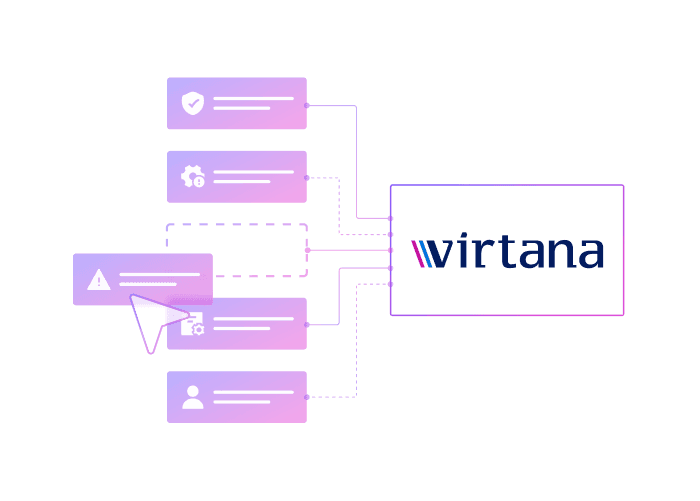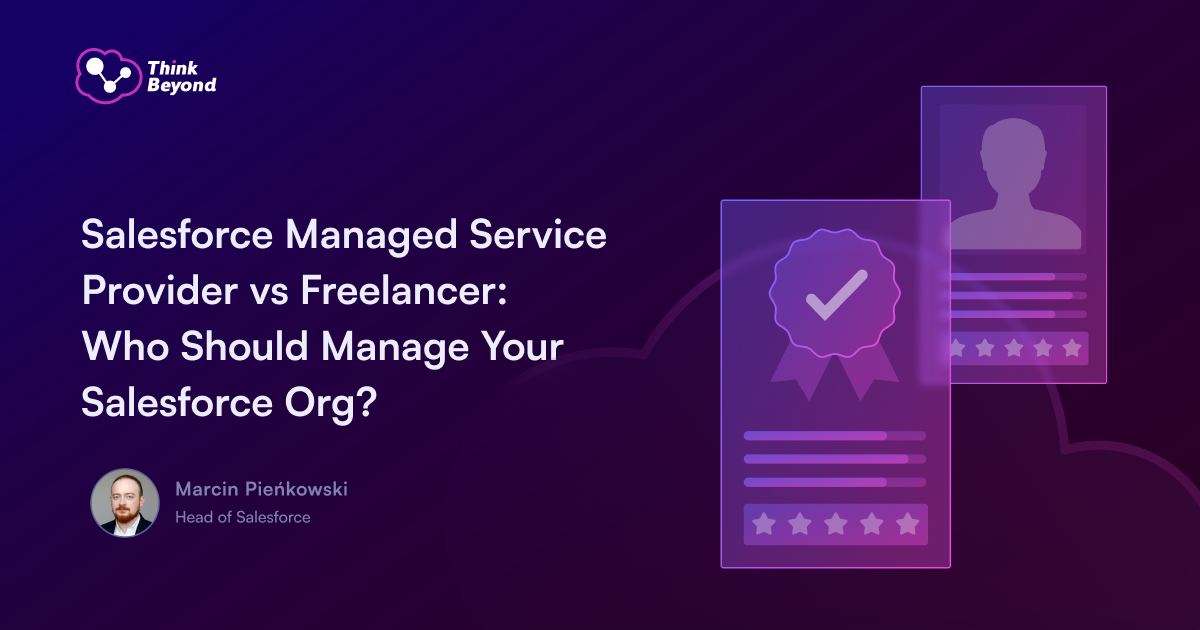The decision between a Salesforce managed service provider and a freelancer has become more significant as the Salesforce consulting ecosystem grows rapidly. The global market was worth about $18.3 billion in 2024. Experts predict it will climb to around $21 billion in 2025 and could reach $57 billion by 2032. This means the market is expected to grow quickly, with an average yearly growth rate of about 15% during this period.
Businesses using this powerful CRM platform face a common question: who should manage their Salesforce org? Freelance Salesforce consultants give companies the flexibility to adjust resources based on immediate needs. Salesforce managed services partners provide more detailed support. Common factors influencing the selection of the right Salesforce service provider are:
- cost management,
- quality control,
- scalability,
- availability of specialist expertise,
- resource access,
- long-term support,
- project continuity,
- communication processes,
- and risk exposure.
Most organisations start with freelancers to augment their staff before they move to managed services as their Salesforce needs evolve. This change happens because maintaining a Salesforce org becomes more complex. Understanding these differences between Salesforce freelancers and managed services providers will help you make the right decision for your business.
Who is a Salesforce Freelancer?
A Salesforce freelancer is a self-employed professional who partners with Salesforce customer organisations. These independent consultants take on projects for specific time periods. They have complete control over their client selection, project scope, and work schedule, unlike professionals who work for consulting firms.
Typical roles and responsibilities
Salesforce freelancers offer specialised services that go beyond simple CRM configuration. Their core responsibilities include:
- Creating and customising Salesforce solutions that line up with specific business needs
- Analysing business operations to spot pain points and growth opportunities
- Setting up the Salesforce platform to solve client issues and reach implementation goals
- Moving data from legacy systems to Salesforce
- Connecting Salesforce with existing business processes and tools
- Building client relationships and communicating with stakeholders.
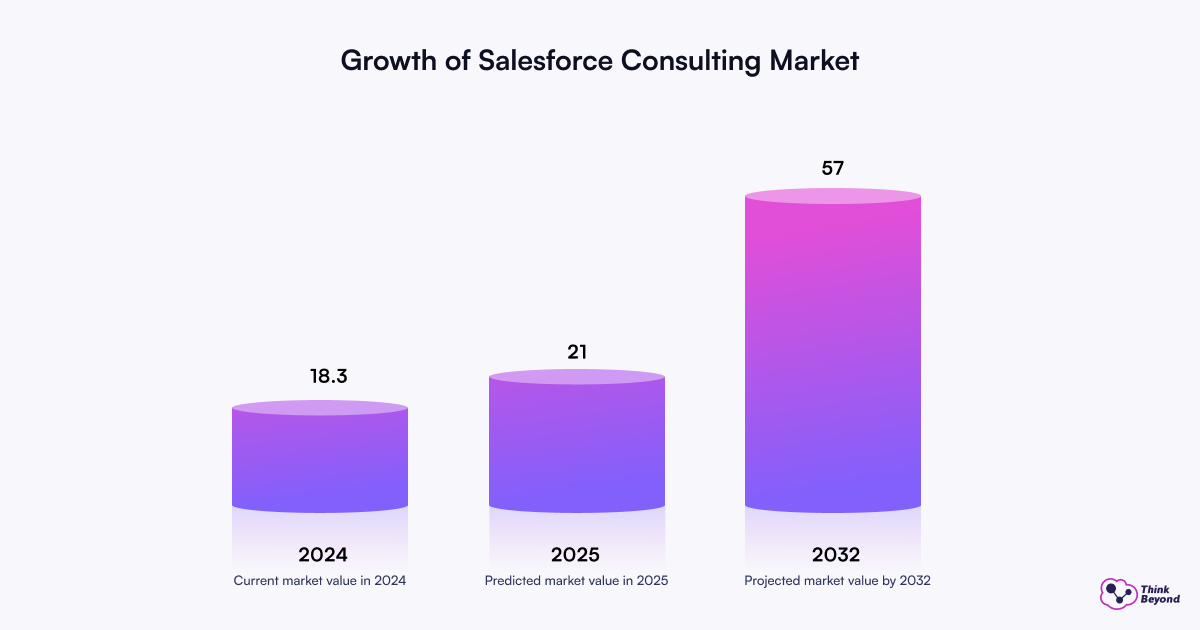
These consultants specialise in implementation projects, automation design, report creation, or custom app development based on their expertise and what their clients need.
The right time to hire a freelance Salesforce consultant
An independent Salesforce consultant can be your best choice in several situations:
- Short-term projects that need specialised skills
- Affordable solutions for businesses with tight budgets but urgent needs
- Resource requirement testing before permanent hiring
- Temporary help during full-time role recruitment (which usually takes 3-4+ months)
- Flexible scaling of resources based on project needs
- Specific tasks that need expert knowledge, like custom reports or workflow setup.
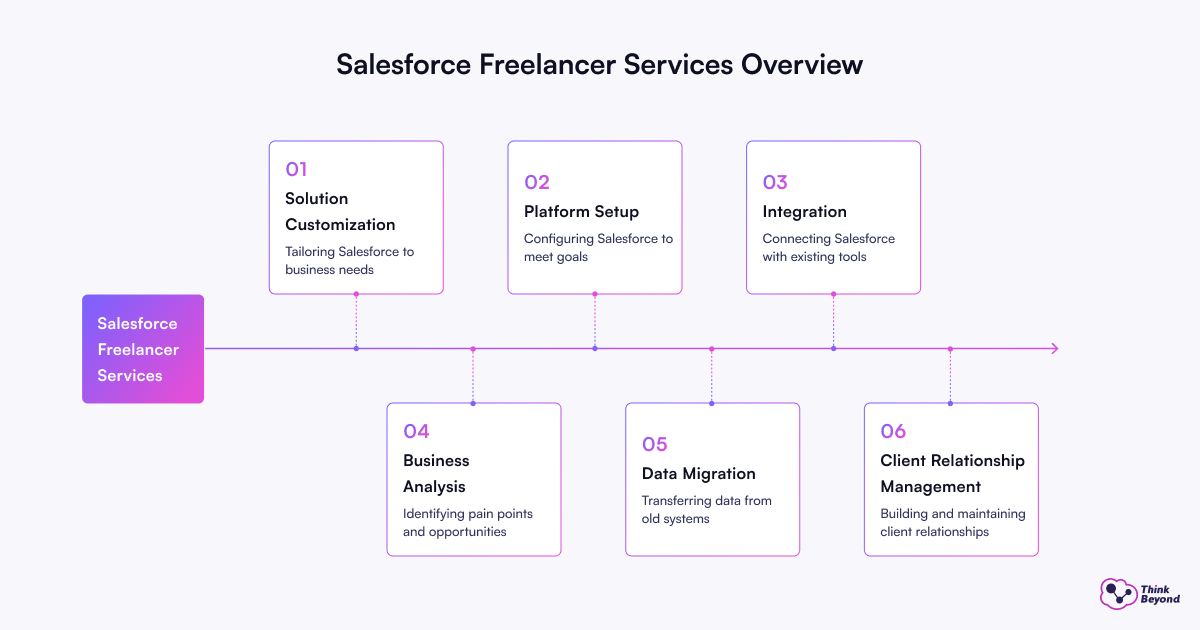
Popular platforms to find Salesforce freelancers
You can connect with qualified Salesforce freelancers through several platforms:
- Popular sites include Upwork, Freelancer, Toptal, Guru, Flexiple
- Specialised Salesforce job boards and community groups on LinkedIn, Reddit, or the Trailblazer Community
- Salesforce’s own AppExchange and job boards such as PeoplePerHour and Wellfound (formerly AngelList)
On top of that, many freelancers build their client base through professional networks and referrals. Networking remains a valuable way to find skilled professionals.
What is a Salesforce Managed Service Provider?
Salesforce Managed Service Providers (MSPs) take over your crucial Salesforce operations. These partners bring their expertise to the table without the need to hire and maintain full-time staff internally.
Definition and service scope
A Salesforce MSP delivers professional services and knows how to manage, optimise, and support Salesforce implementations. They become part of your team and handle everything from implementation to customisation, integration, data management, and administration. Instead of working on individual projects, MSPs provide their complete services through subscriptions or retainer agreements.
Salesforce partner vs in-house admin
The choice between an MSP and in-house administration comes with specific advantages and challenges:
- MSPs come with predictable subscription pricing. In-house teams need more upfront investment in hiring, training, and tools.
- MSPs give you access to certified, high-class specialists with experience from multiple organisations. In-house admins focus solely on your business but have limited expertise.
- MSPs have a unique advantage because they bring together specialists who have in-depth knowledge of multiple areas, industries, and Salesforce products.
- MSPs adapt quickly as your needs change without hiring more people. This makes them perfect for small businesses needing expertise and large enterprises managing complex integrations.
Types of support offered by MSPs
Salesforce MSPs excel in several support areas:
- Administrative Support when handling everyday platform management tasks such as user management, setting up and maintaining security, backing up your data, and monitoring system health. This ensures your Salesforce system runs smoothly and securely without interruptions.
- Strategic Guidance, which means analysing your business goals and Salesforce usage. They offer expert advice on how to improve your processes and create a clear roadmap for future growth to make sure Salesforce keeps supporting your evolving business needs.
- Development Services when standard Salesforce features aren’t enough. MSPs develop custom solutions tailored to your specific requirements. This includes automating workflows, integrating third-party tools, and building new features that enhance productivity and efficiency.
- Training and Adoption to your team so they can fully use Salesforce’s capabilities. Better training helps users work smarter and boosts overall adoption of the platform, leading to higher productivity.
- Proactive Monitoring to spot and fix issues before they impact your daily operations. This proactive approach helps avoid downtime and keeps your business running smoothly.
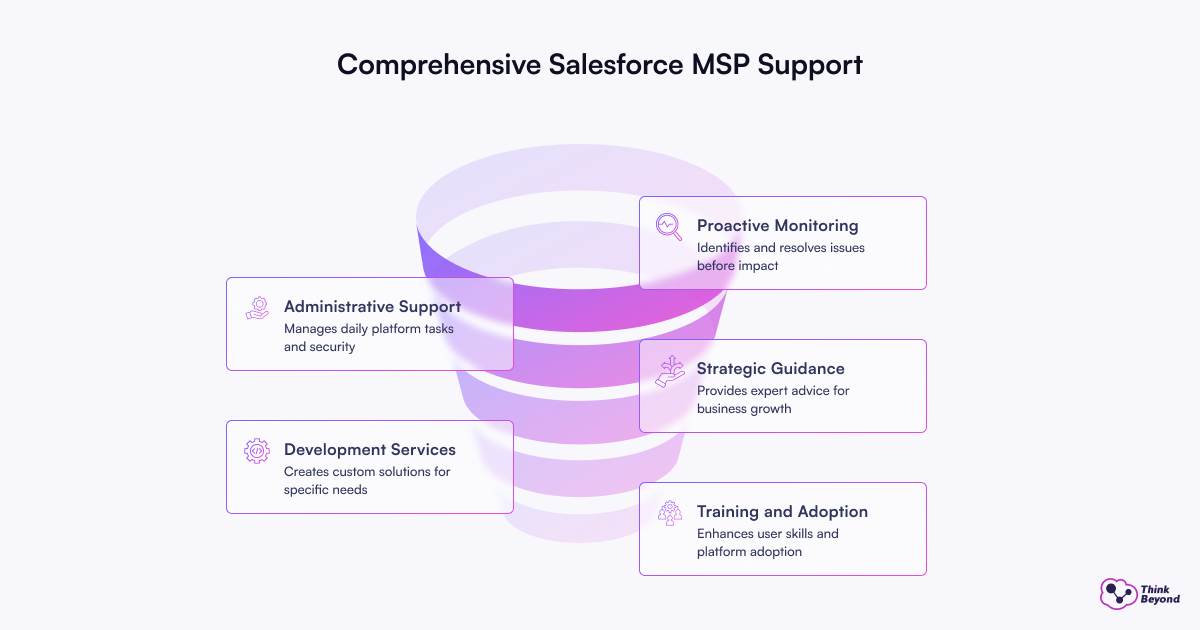
Salesforce Managed Service Provider vs Freelancer: Key Differences
Freelancers and MSPs work in fundamentally different ways. Organisations need to understand these differences to make informed decisions that match their needs.
Engagement model: Task-based vs Retainer-based
Freelancers work on a task-oriented basis. They define deliverables through a scope of work and fixed cost. Companies can bring in talent for specific projects without making long-term commitments. MSPs, on the other hand, work through retainer-based relationships. Clients pay monthly fees for ongoing access to services. This creates predictable work patterns and builds lasting partnerships.
Expertise depth: Niche skills vs Team-based knowledge
Freelancers excel in specialised areas of Salesforce functions or clouds. MSPs bring together teams of administrators, developers, analysts, architects, and project managers. Their team approach helps them solve complex problems through shared knowledge and varied skill sets.
Availability and scalability
Independent Salesforce consultants often work with multiple clients at once. This can make them less available for urgent issues. Managed services scale better because they have dedicated resources that adapt quickly to changing needs.
Cost structure: Hourly vs Flexible Payments
Freelancers typically charge hourly rates based on their location and area of expertise. They offer straightforward pay-as-you-go billing. MSPs, on the other hand, use more flexible payment methods, such as subscription models with set monthly fees that cover agreed-upon service hours. They also use retainer agreements for ongoing support, pay-as-you-go or tiered pricing plans that align costs with the level of usage or the complexity of the services provided.
Support continuity and SLAs
MSPs offer formal service level agreements (SLAs) that specify response times and how issues get resolved. These agreements ensure reliable support that most freelancers cannot match. On the other hand, Salesforce freelancers lack formal service guarantees. They typically do not provide SLAs, detailed documentation, or logs. This makes tracking work and maintaining consistent quality more challenging.
Offshoring/ Nearshoring
To access a broader pool of expertise, potentially lower costs, and around-the-clock support, it is common to select a managed service provider located in a different country, rather than relying solely on local providers, including Salesforce freelancers.
Pros and Cons of Each Option
Businesses must evaluate both the advantages and limitations of each approach to pick the right Salesforce support option that fits their specific needs.
Advantages of hiring Salesforce freelancers
Salesforce freelance consultants are budget-friendly. Companies pay only for delivered work without extra overhead costs. Their hourly rates are lower than those of agency consultants. These professionals bring specialised expertise in specific Salesforce functions like Apex, Visualforce, or Lightning Components. Organisations can quickly scale resources based on project demands thanks to their flexibility. Freelancers excel at handling short-term, specialised project tasks.
Limitations of freelancers for long-term needs
Freelancers’ benefits come with certain challenges. Managing multiple freelancers becomes harder as businesses expand. The initial cost savings decrease once you factor in extra internal management time. Most freelancers work with several clients at once, which can limit their availability. Relying on a single person creates risk – work stops without backup support during their time off.
Benefits of Salesforce managed services
Salesforce consulting partners deliver complete expertise through teams of experienced Salesforce professionals and a full range of services. They actively monitor and spot potential issues before these problems affect operations. MSPs offer expandable solutions that adapt to business changes without hiring more people. Their predictable subscription pricing models help reduce overall costs.
Challenges with MSPs for small projects
MSPs might be too much for smaller projects. Their pricing structure often carries overhead costs that don’t make financial sense for limited work. These providers work best with organisations that need ongoing support rather than occasional help. Small businesses with basic Salesforce needs might find MSPs’ extensive capabilities unnecessary and expensive.
Comparison Table
| Aspect | Salesforce Freelancer | Managed Service Provider (MSP) |
| Engagement Model | Task-based, fixed scope | Retainer-based, ongoing partnership |
| Cost Structure | Hourly rates | Various payment solutions |
| Expertise Type | Specialised skills in specific functions | Teams with expertise in a variety of areas |
| Availability | Multiple client commitments limit time | Dedicated resources with defined SLAs |
| Scalability | Quick scaling for short-term needs | Adapts to changing needs without hiring |
| Support Structure | Individual support, no formal SLAs | Clear SLAs with defined response times |
Setting Clear Expectations: The Foundation of Salesforce Success with Your Consulting Partner
The choice between a Salesforce freelancer and a Salesforce consulting partner ended up depending on your organisation’s specific needs, budget limits, and long-term goals.
Clear expectations, detailed documentation, and proper arrangement with business goals are the foundations of successful Salesforce management, whatever path you choose. The remarkable growth of the Salesforce ecosystem shows why this decision matters. The right support structure substantially affects how well your organisation utilises this powerful platform.
FAQs
What is the typical cost range for hiring a Salesforce freelancer?
Freelance Salesforce consultants generally charge hourly rates ranging from $100 to $250, depending on their experience and expertise. The market rate for independent consultants is typically around $150 per hour.
How does a Salesforce Managed Service Provider (MSP) differ from a freelancer?
An MSP offers ongoing, comprehensive support through a team of specialists on a subscription basis, while freelancers typically work on short-term, specific tasks. MSPs provide broader expertise and scalability, whereas freelancers offer specialised skills for targeted needs.
What are the advantages of hiring a Salesforce freelancer?
Freelancers offer cost-efficiency for short-term projects, specialised expertise in specific Salesforce functions, and flexibility to scale resources based on immediate needs. They are ideal for businesses with limited budgets or those requiring niche skills for particular tasks.
When should a company consider using a Salesforce consulting partner?
Companies should consider an MSP when they need long-term, consistent support for their Salesforce org, require a diverse range of expertise, or have complex implementations. MSPs are particularly beneficial for organisations seeking proactive monitoring, strategic guidance, and scalable solutions as their Salesforce needs evolve.
How can businesses decide between a freelancer and an MSP for their Salesforce needs?
The decision depends on the organisation’s specific requirements, budget, and long-term objectives. Small businesses with limited scope might benefit from freelance talent, while enterprises with complex integrations and continuous support needs may find greater value in an MSP partnership. Some companies start with freelancers for initial projects before transitioning to managed services as their Salesforce implementation grows more sophisticated.
Case Study
Virtana: Salesforce Managed Services
Managing day-to-day Salesforce operations
